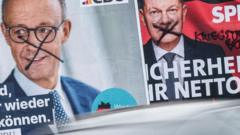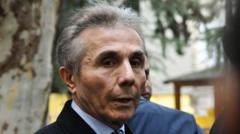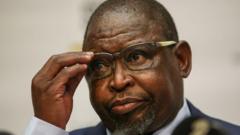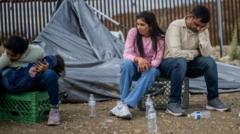As Germany prepares for a crucial snap election on February 23rd, voters face a range of candidates and significant issues, including immigration reform and economic revitalization. The leading contender, Friedrich Merz of the Christian Democrats, supports stricter immigration policies, while challengers like Olaf Scholz and Alice Weidel represent differing views. With a volatile political climate, the outcome could reshape Germany's future.
Insights into the Upcoming German Elections and Their Implications

Insights into the Upcoming German Elections and Their Implications
With major political shifts and pressing issues, the German elections on February 23rd are crucial for the future of the nation's governance and direction.
German citizens will head to the polls on February 23rd to elect their next parliament, the Bundestag, following the collapse of Chancellor Olaf Scholz's coalition government. This snap election is primarily focused on two pressing issues: controlling immigration and revitalizing Germany's economy, which is currently the largest in Europe. Friedrich Merz, the candidate for the conservative Christian Democrats (CDU), is favored to obtain the most votes amidst growing concerns over recent violent incidents that have intensified scrutiny of immigration policies and asylum rules.
This election is taking place in the context of heightened public anxiety following a series of deadly attacks, the most recent being a car-ramming incident in Munich linked to an Afghan national. Such events have fueled support for the far-right Alternative for Germany (AfD), raising alarms among traditional parties, although no coalition with the AfD is currently anticipated. A significant showing by the AfD could see their representation in the Bundestag expand dramatically, potentially doubling their seats.
As per the rules, German citizens aged 18 and over can vote from 08:00 to 18:00 on the election day. Candidates include Merz, who leads in polls and is promising rigorous border controls and reduced welfare spending, amid criticisms for courting votes from the AfD. In contrast, Scholz, who leads the Social Democrats (SPD), has struggled with his coalition and advocates for increased investment and higher minimum wages.
The political landscape is further complicated by Alice Weidel of the AfD, who, despite little chance of winning, resonates with younger voters and promotes radical policies like "remigration." Concurrently, Robert Habeck of the Green Party criticizes Merz's alliances and emphasizes environmental policy, whilst Sahra Wagenknecht of the BSW party showcases a left-leaning stance with strict immigration limits.
Voter engagement will also be influenced by the complexity of the electoral system, which allows for coalitions that could shape government post-election. The CDU and CSU are expected to lead in seats, but Merz's rejection of an alliance with the AfD posits challenges in forming a viable government. This backdrop indicates a potentially transformative election as parties scramble to align themselves with voter sentiments on immigration and economic recovery in Germany.





















